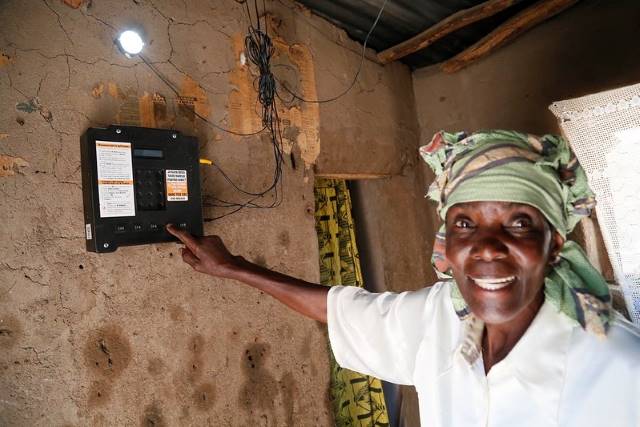Electricity Access: Improving Energy in Africa
 One in 10 people in the world (800 million) have no access to electricity and the access of an additional 2.8 billion people is considered insufficient and unreliable. In regions with insufficient access to electricity, the standard of living is poor, particularly with regard to adequate healthcare and education. Africa is such a region. Half of the population of sub-Saharan Africa lives without electricity. Improving energy in Africa is essential for economic growth and prosperity across the continent.
One in 10 people in the world (800 million) have no access to electricity and the access of an additional 2.8 billion people is considered insufficient and unreliable. In regions with insufficient access to electricity, the standard of living is poor, particularly with regard to adequate healthcare and education. Africa is such a region. Half of the population of sub-Saharan Africa lives without electricity. Improving energy in Africa is essential for economic growth and prosperity across the continent.
The Consequences of Inadequate Energy Access
Energy is vital to reduce the cost of business activities and for creating economic opportunities and jobs. More than 640 million Africans lack access to electricity. When the sun sets for these individuals, workable hours in the day end. Insufficient access to energy can also restrict the economy more indirectly, by way of increased risk of deaths related to wood-burning stoves, restricted hospital and emergency services and compromised access to education.
Along with appropriate infrastructure, household health and productivity are essential for boosting economies. The persistent use of wood-burning stoves is evidence of lacking infrastructure that presents a burden to health and productivity. This dated method has drawbacks that include indoor pollution, deforestation and unpaid time spent collecting biomass fuel. In 2017, an estimated 600,000 Africans died due to indoor pollution.
Fulfilling household responsibilities requires more time and must be done within restricted hours when electricity is unavailable. These responsibilities often fall on women and children and prevent their participation in the formal economy or pursuit of education that could encourage later participation. African economies suffer because of these barriers to participation. Industrialization is key to economic growth in Africa. To industrialize the continent, energy in Africa needs to be sustainable and easily accessible to all.
Improving Energy in Africa
Africa already has significant capacity for improvements in energy. Much of this potential lies in renewable energy sources. For example, one-fifth of Africa’s current energy is produced using hydropower. Hydropower, however, is only being utilized to one-tenth of its potential. Along with hydropower energy, solar, biomass, wind and geothermal energy all show promise for further development.
There are several existing avenues for further development of energy in Africa. As a shift toward renewable energy is gaining momentum across the globe, largely due to its environmental advantages, the resulting new and affordable technologies may provide the needed boost to further industrialization in Africa. Ensuring that renewable energy innovations reach Africa and are suited to build on current capabilities is essential for economic growth throughout the continent.
The 2020 African Economic Conference (AEC)
The African Development Bank (AfDB), the Economic Commission for Africa and the United Nations Development Programme jointly hosted the 2020 African Economic Conference (AEC) from Dec. 8 to 10. The conference facilitated presentations and discussions among leading academics, early-career researchers, policymakers and decision-makers. The central theme of the conference was how to ensure continued sustainable development in Africa amid the challenges posed by the COVID-19 pandemic. Specific topics included the role of governments and private institutions in regulating and developing African economies, adjusting goals and methods to conditions brought on by COVID-19 and preparing Africa for future resilience in crisis. The conference has been held since 2006 and helps to maximally inform efforts toward development in Africa, consider the challenges unique to local economies and emphasizes the importance of sustainable and renewable energy.
The New Deal on Energy in Africa
The AfDB Group is leading the New Deal on Energy in Africa to help develop energy in Africa and achieve universal electricity access for Africans by 2025. Its strategy is to build awareness of barriers to economic development, secure innovative funding for energy developments and strengthen energy policy and regulation. According to the AfDB, without stable energy in Africa, the U.N. Sustainable Development Goals will not be achieved. The emphasized ideal for energy in Africa is renewable; nevertheless, efficient and less expensive methods of energy production can quickly work to stimulate the economy. Gas will be an important transition fuel as efforts are made to establish cleaner, maintainable methods.
Electricity Access for Economic Growth
Improving energy in Africa means that the continent needs reliable power grids and universal access to electricity to further economic stability. The path to sustainable energy in Africa is evolving thanks to new momentum derived from the global and continental potential for renewable energy development. Keeping energy progress in mind throughout pandemic response efforts is a goal of international organizations as they work together with Africa toward economic growth across the continent.
– Payton Unger
Photo: Flickr
